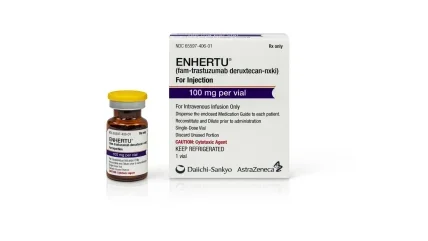
AstraZeneca and Daiichi Sankyo announced that the Food and Drug Administration (FDA) has granted priority review for Enhertu (trastuzumab deruxtecan) in treating a type of breast cancer.
The US health regulator accepted the companies’ supplemental Biologics License Application (sBLA) for Enhertu, which is based on results from the Phase 3 DESTINY-Breast06 trial.
Enhertu is a HER2-directed antibody-drug conjugate (ADC), discovered by Daiichi Sankyo and jointly developed and commercialised by AstraZeneca and Daiichi Sankyo.
The drug is indicated for adults with unresectable or metastatic HER2-low or HER2-ultralow breast cancer who have received at least one endocrine therapy in the metastatic setting.
The US FDA has set a Prescription Drug User Fee Act during the first quarter of 2025.
AstraZeneca oncology R&D executive vice president Susan Galbraith said: “While endocrine therapies are widely used in the initial treatment of HR-positive metastatic breast cancer, most patients see limited benefit with additional lines of treatment, and subsequent chemotherapy is associated with poor response rates and outcomes.
“The results from DESTINY-Breast06 show that Enhertu has the potential to evolve the current HR-positive treatment landscape and become the first targeted treatment for patients with HER2-low or HER2-ultralow expression following endocrine therapy.”
AstraZeneca and Daiichi Sankyo’s sBLA is based on data from the Phase 3 DESTINY-Breast06 trial, which evaluated the efficacy and safety of Enhertu versus chemotherapy.
The DESTINY-Breast06 study enrolled 866 patients randomised at multiple sites in Asia, Europe, Australia, North America, and South America.
In the Phase 3 study, Enhertu reduced the risk of disease progression or death by 37% by blinded independent central review (BICR) compared to chemotherapy in the overall population.
The primary endpoint analysis of patients with HER2-low expression showed a median progression-free survival (PFS) of 13.2 months, compared to 8.1 months with chemotherapy.
Also, Enhertu showed a median PFS of 13.2 months versus 8.3 months with chemotherapy, in a prespecified exploratory analysis of patients with HER2-ultralow expression.
In the DESTINY-Breast06 study, Enhertu showed a safety profile consistent with previous clinical trials of the drug in breast cancer with no new safety concerns identified.
Daiichi Sankyo R&D global head Ken Takeshita said: “This Priority Review highlights the potential to expand the existing indication of Enhertu in HER2-low metastatic breast cancer to include use in an earlier disease setting as well as in a broader patient population that includes HER2-ultralow.
“We look forward to working closely with the FDA with the goal of bringing Enhertu to more patients as quickly as possible.”






